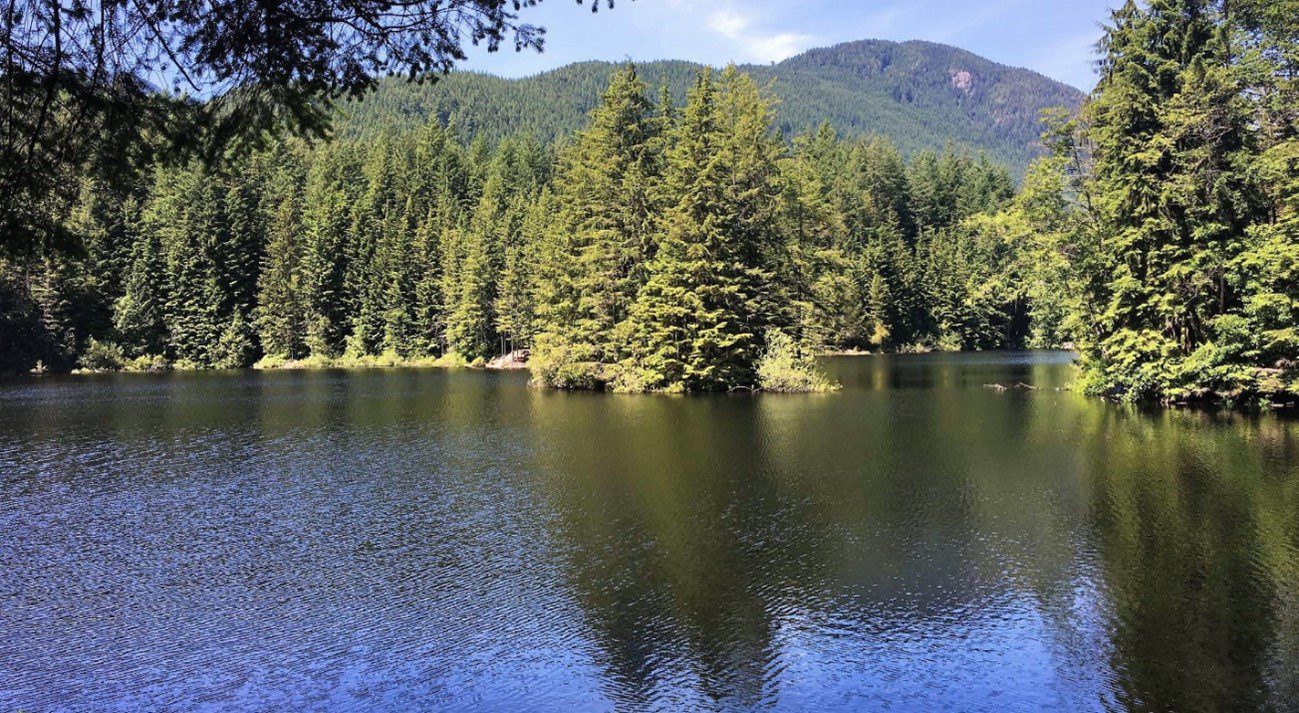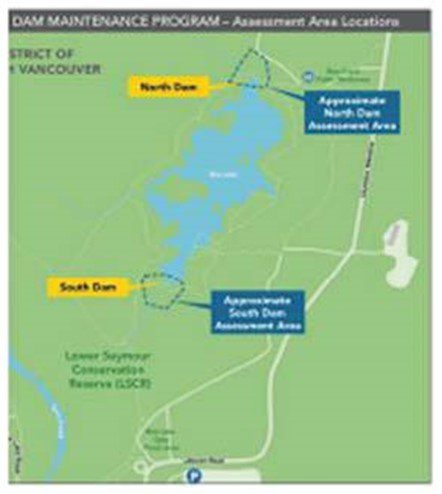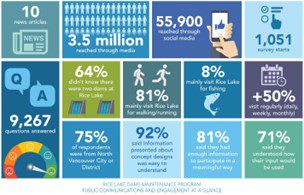Water infrastructure project a winning education opportunity in Vancouver, B.C.
November 2, 2023

AWWA Articles
Water infrastructure project a winning education opportunity in Vancouver, B.C.
Located in British Columbia, Canada, Metro Vancouver is a federation of 21 municipalities, one electoral area, and one treaty First Nation, that collaboratively plans for and delivers regional-scale services, including drinking water, to 2.8 million residents. The drinking water comes from rainfall and snowmelt in three water supply areas, and Metro Vancouver also owns, maintains, and operates a number of dams to collect this water.
 In the North Shore mountains beside Vancouver, British Columbia, Rice Lake and a surrounding conservation reserve are a popular location for outdoor enthusiasts who fish and hike. Hidden beneath the recreational trails are two dams at each end of the lake, owned and operated by Metro Vancouver. (Pictured right, Rice Lake, North Vancouver, B.C.)
In the North Shore mountains beside Vancouver, British Columbia, Rice Lake and a surrounding conservation reserve are a popular location for outdoor enthusiasts who fish and hike. Hidden beneath the recreational trails are two dams at each end of the lake, owned and operated by Metro Vancouver. (Pictured right, Rice Lake, North Vancouver, B.C.)
In spring 2022, a review of the dams, per British Columbia’s Dam Safety Regulations, determined that a significant amount of vegetation and trees needed to be removed from the perimeter of both dams for maintenance, monitoring, and safety reasons.
“The combination of high interest in the public safety enhancements on Metro Vancouver’s dams alongside a region-wide passion for protecting trees, presented a unique opportunity for Metro Vancouver to create an in-depth and meaningful engagement on tree removal around the Rice Lake dams to inform the future use of that space,” said Vanessa Anthony, engagement manager for the water services department at Metro Vancouver.
The organization’s resulting communications and engagement program about the maintenance work related to the dams was awarded the American Water Works Association’s 2023 Public Communications Achievement Award.
Setting an engaging foundation
 To maintain its reputation as an open and transparent government organization, Metro Vancouver recognized the following considerations regarding the Rice Lake Dams Maintenance Program:
To maintain its reputation as an open and transparent government organization, Metro Vancouver recognized the following considerations regarding the Rice Lake Dams Maintenance Program:
- Tree removal is a sensitive issue for the region’s residents.
- Thousands of people regularly visit Rice Lake to enjoy natural surroundings and densely treed trails, and they have a strong sense of ownership of the area.
- Those with the highest interest in the area are media-savvy and vocal about environmental issues.
- Metro Vancouver needed to reinforce its commitment to properly maintain drinking water infrastructure.
“Given the general lack of public awareness about the water supply area and existing dam infrastructure at Rice Lake, and associated maintenance activities, Metro Vancouver developed a communications and engagement strategy to build awareness about the dams, gain acceptance for tree removal, and solicit input from the community on how the newly created open spaces can be repurposed,” Anthony said. (Pictured right, map of Rice Lake dams.)
A key part of the proactive strategy was to collaborate with and solicit meaningful feedback from interested and affected parties around the Rice Lake area, which is located on the territory of the Squamish and Tsleil-Waututh First Nations. These groups included the Indigenous communities, neighboring municipalities, trail users and special interest groups. Tactics included letters, presentations, onsite tours, feedback surveys, and virtual meetings.
Leveraging public education opportunities
 While it was important to educate the public about why the work was necessary to ensure the Rice Lake dams complied with safety regulations, Metro Vancouver also took the opportunity to raise awareness about its hidden drinking water infrastructure and upcoming dam maintenance work, including articles in 10 publications, a video about the rich history of Rice Lake dating back to the 1900s, a program webpage and social media posts.
While it was important to educate the public about why the work was necessary to ensure the Rice Lake dams complied with safety regulations, Metro Vancouver also took the opportunity to raise awareness about its hidden drinking water infrastructure and upcoming dam maintenance work, including articles in 10 publications, a video about the rich history of Rice Lake dating back to the 1900s, a program webpage and social media posts.
“The strategy mitigated issues surrounding the tree removal as evidenced by the positive tone of the program’s media pick up and very few calls to the organization’s information line,” Anthony said. “Only two complaints were logged over the phone during the course of the campaign.” (Pictured right, summary of Rice Lake communications and engagement results.)
In addition, Metro Vancouver conducted a two-month online engagement survey to collect input on how to repurpose the new, open spaces that will be created next to the north and south dams, resulting in about 1,000 responses.
“Metro Vancouver continues to work on ways to ensure the public understands how their input is used,” Anthony said. “The project team will report out on the survey results through onsite signage and online, demonstrating how the feedback directly influences the final design of the new, open spaces at Rice Lake.”
Photos and images courtesy of Metro Vancouver.
Advertisement